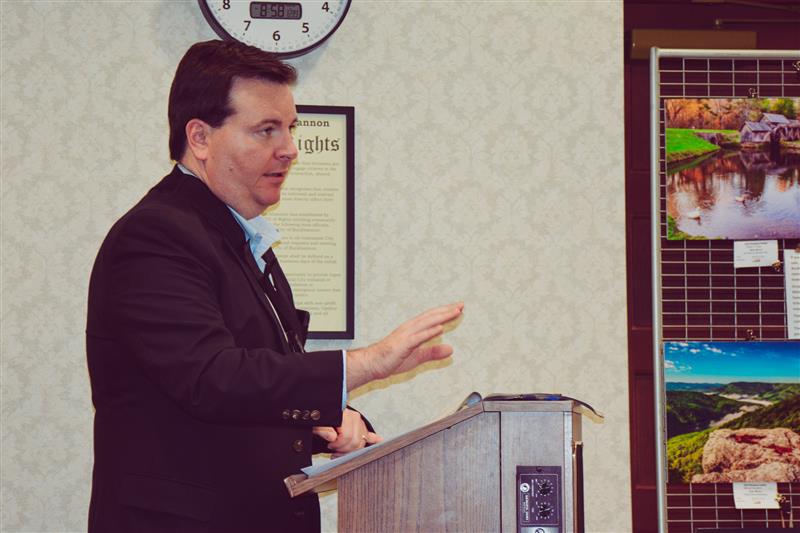BUCKHANNON – Buckhannon City Council had planned to consider an ordinance that would implement a 1 percent municipal sales, use and service tax at its Dec. 20 meeting Thursday.
However, the West Virginia Department of Revenue, which oversees a variety of agencies including the W.Va. State Department, threw a wrench in those plans Tuesday.
According to its agenda, council had intended to take up Ordinance 433, a law establishing municipal sales, service and use tax as a strategic issue that could be voted on at its meeting Thursday. In November, the council approved a preliminary ordinance authorizing the city to submit an application to the West Virginia Municipal Home Rule Board to amend its home rule plan.
The amendment to the home rule plan – which permits more control at the local level based on the city’s needs – is the imposition of a 1 percent municipal sales, service and use tax.
However, O’Neill said city officials learned Tuesday they weren’t permitted to hold a first reading on the law that would actually impose the sales tax until the Municipal Home Rule Board approves the proposed amendment to the plan (the addition of a municipal sales tax).
O’Neill said the Municipal Home Rule Board won’t convene until Jan. 16, meaning that if the board approves the amendment, a first reading can’t be considered until council’s regularly scheduled Thursday, Jan. 17 meeting.
Should Ordinance 433 pass on first reading, a public hearing on – and second reading of – the ordinance would be slated for council’s Feb. 7 meeting, O’Neill said.
“We cannot do the first reading (of the municipal sales tax ordinance) prior to the home rule board meeting and possible approval on Jan. 16,” the city attorney told My Buckhannon Tuesday evening. “If the home rule plan amendment is granted, the first reading will be Jan. 17 and a public hearing and second reading on Feb. 7.”
In addition to securing the home rule board’s approval, Buckhannon also has to receive the blessing of the state tax commissioner. So at council’s Dec. 6 meeting, O’Neill told council the city intended to submit the paperwork to the home rule board and the state tax commissioner on a “dual track,” meaning all paperwork necessary to start the tax implementation process would be submitted by the end of 2018.
City officials say the 1 percent sales, service and use tax would generate approximately $1 million – funds they say are critical to maintaining public safety and utility services at their current level.
For instance, at council’s Dec. 6 meeting, finance and administrative director Amberle Jenkins told council the city’s general fund owed the sanitary board money to complete storm water projects because the sanitary board isn’t permitted to use sanitary sewer money to pay for storm water projects.
(The city is comprised of four enterprise funds, or separate accounts, including the sanitary board, water board, waste board and general fund.)
“I’m telling you that probably because towards the end of the year, we may have to come up with some more storm water money in the general fund budget,” Jenkins said at the Dec. 6 meeting. “It’s one of those things we talked about [that the] sales tax [can be used for]. Sanitary cannot use sewer funds to work on these projects, so general fund has to reimburse them.”
O’Neill said Tuesday council will likely discuss a draft of Ordinance 433 Thursday, but won’t take any action on it.
According to the latest draft of the ordinance, the law, if passed, would accomplish three objectives: establishing a 1 percent sales, service and use tax; establishing a revenue fund into which that tax would be deposited; and amending the business and occupation tax to reduce the rate by 5 cents per $100 of annual adjusted gross income exceeding $1 million.
The city has a $1 million exemption on B&O tax, meaning the first $1 million of annual adjusted gross income a business makes is entirely exempt from being taxed. However, if a city imposes a sales, service and use tax – even through the means of a home rule plan – the B&O tax must be adjusted according to state statute, O’Neill and Buckhannon mayor David McCauley have noted on several occasions.
In addition to setting the municipal tax rate at 1 percent – the maximum allowable – and reducing the B&O tax for businesses bringing in over $1 million, Ordinance 433 would establish a system wherein the 1 percent municipal tax collected would deposited directly into a special revenue fund, O’Neill explained at the early December meeting.
“The reason why the ordinance is designed that way is that if revenue is collected into a special revenue fund, it can then be used to finance revenue bonds without going through a public vote process,” O’Neill explained at the time. “State code permits that.”
However, the city attorney said just because the tax money is initially deposited into a special revenue fund doesn’t mean it must stay put.
“Just because the funds go into a special revenue account, it does not mean they have to stay there to pay off revenue bonds,” O’Neill told council. “In the event that the city does not opt to issue revenue bonds to be paid off by the municipal sales and use tax, then any money that is not needed for that can then be placed into general revenue.”
For example, should the city opt to complete a “significant storm water system improvement project” or other large capital improvement project, O’Neill explained, “we could take care of that project, bond it out, pay for it all up front, and then use the proceeds from the sales and use tax to pay off those bonds.”
McCauley said although the ordinance is designed to give the city flexibility, he wanted to emphasize Buckhannon’s general fund doesn’t have bonds to be paid off currently.
“I want to be sure everybody understands, we don’t have any outstanding general revenue fund bonds right now,” he said. “Our utility operations, our enterprise operations, do, [but we don’t], so don’t be thinking that, ‘Oh my goodness, I thought you were going to realize a new $1 million a year for the general fund.’
“That’s still the anticipation,” the mayor added. “It’s not like, ‘oh, now $700,000 of [the tax collected is] going to go to pay bonds off.’ We don’t have any of those. But we will have the mechanism … to more facilely, easily, quickly, exactly pay off bonds if necessary.”
Council meetings take place on the first and third Thursday of every month at 7 p.m. at city hall.













